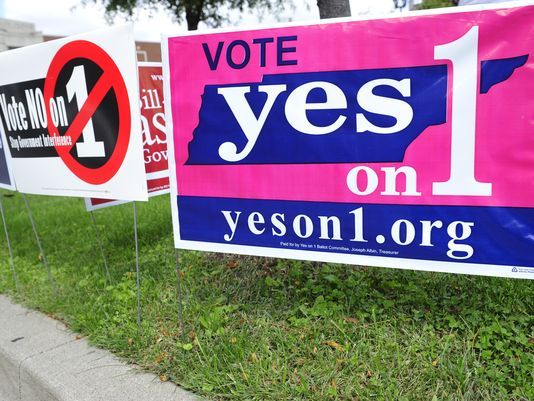In a victory for abortion opponents, a federal appeals court on Tuesday upheld the 2014 vote in favor of Amendment 1, a ballot measure that stripped the right to an abortion from the Tennessee constitution.
Eight voters who opposed the measure had immediately challenged the outcome of the vote, claiming the way the state counted ballots was unconstitutional. They sought a recount.
The measure opened a path for lawmakers to enact stricter abortion regulations, including a 48-hour waiting period for women seeking the procedure, which was signed into law by the governor in 2015.
The challenge to the Amendment 1 vote count loomed over state policy makers for three years, making the future of abortion measures enacted by the legislature after its passage uncertain.
"Although the subject matter of abortion rights will continue to be controversial in Tennessee and across the nation, it is time for uncertainty surrounding the people's 2014 approval and ratification of Amendment 1 to be put to rest," the 27-page ruling concluded.
During the House's first floor session of the new year, Rep. Bill Dunn, R-Knoxville, shared news of the appeals court's decision.
“Today, the court decision came down and the court decided with the will of the people of Tennessee and our constitution has been amended,” Dunn said, receiving applause and a standing ovation from many on the chamber's floor.
Brian Harris, president of Tennessee Right to Life, called the three-judge panel's ruling "a great victory."
"So grateful to the voters, legislators, the AG (Attorney General), Secretary of State and coordinator of elections," Harris texted. "This is a great victory for the people of Tennessee whose compassion and concern for the protection of human life is vindicated again today."
Amendment 1 was the most hotly contested and most expensive Tennessee ballot measure in recent years – one that brought an unprecedented level of voter organizing, phone banking and attention from national groups on both sides of the abortion issue.
The measure, passed by 53 percent of voters in November 2014, added language to the state constitution that said, in part: "Nothing in this Constitution secures or protects a right to abortion."
The unusual legal challenge that followed, however, concerned the state's long-standing method of counting votes on ballot measures, not abortion policy.
Unlike a simple majority required for candidates, the Tennessee constitution requires ballot measures to succeed with a "majority of all the citizens of the state voting for governor, voting in their favor."
State attorneys and election officials contend that ballot measures must receive a majority of the number of votes cast for governor to succeed.
But the voters who challenged the state's counting methods, including the former chair of the board of Planned Parenthood, argued that phrase requires the same voters to cast ballots in both the governor's race and a ballot measure in order for their votes count.
They also argued that anti-Amendment 1 votes were "diluted" by pro-Amendment 1 voters who consciously abstained from voting for governor. They noted that abortion opponents encouraged voters to abstain from voting in the governor's race in order for their vote to carry more weight on Amendment 1.
A federal judge in Nashville agreed with them, ordering a recount – a decision that has been on hold for the past year pending the Sixth Circuit appeal.
A day before the federal judge's ruling, a judge in Williamson County reached the opposite conclusion, ruling that the state's longstanding methods of counting ballots was the correct one.
The Sixth Circuit decision made clear the Williamson County ruling, which was not appealed, was the correct interpretation of vote counting methods and that election officials vote counting methods were "reasonable and true."
The court further concluded that no voters' rights were hindered by the state's counting methods.
"It appears that every Tennessee voter was free to vote his or her conscience on the amendment and for governor," the ruling said.
"Plaintiffs arguments amount to little more than a complaint that the campaigns in support of Amendment 1, operating withing the framework established by state law, turned out to be more successful than the campaigns against Amendment 1."
"Plaintiffs had the same 'freedom' as their adversaries to operate within the established framework to promote their opposition to Amendment 1."
A separate legal challenge to Tennessee's 48-hour abortion waiting period is pending in federal court.
Comment from the office of the Attorney General, which defended the lawsuit, and lawyers for the plaintiffs, was not immediately available.
Full text of Amendment 1
Nothing in this Constitution secures or protects a right to abortion or requires the funding of an abortion. The people retain the right through their elected state representatives or state senators to enact, amend, or repeal statutes regarding abortion, including, but not limited to, circumstances of pregnancy resulting from rape or incest or when necessary to save the life of the mother.
This story will be updated.
Reporter Joel Ebert contributed. Reach Anita Wadhwani at awadhwani@tennessean.com or on Twitter @AnitaWadhwani.


